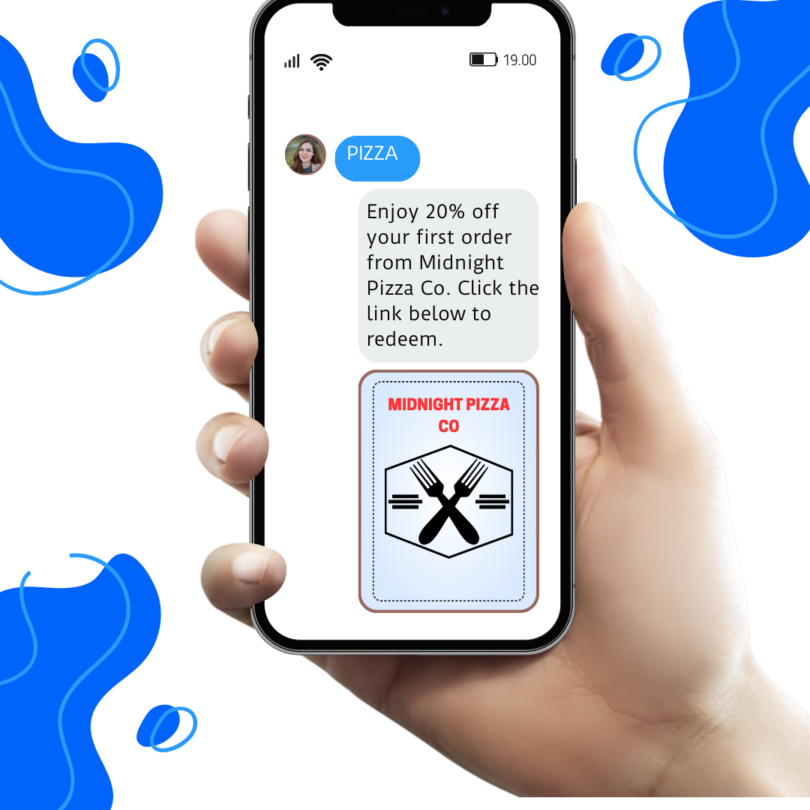What is an SMS Keyword?
An SMS keyword is a word or phrase that people can text to a specific number to opt-in to a marketing campaign. The keyword is typically the first point of contact between the customer and the brand, so it’s important to choose a keyword that is easy to remember, relevant to your brand, and can be easily shared on different platforms.
SMS keywords are a valuable tool for lead generation, allowing businesses to easily engage with their audience and promote their products or services. When customers come across a keyword displayed on a website, social media post, or other marketing material, they can simply send a text message with the keyword to a specific phone number to opt-in to a marketing campaign. This process, known as an opt-in, enables businesses to capture leads and build their customer base.
The contact’s number is then added to a special list under the corresponding keyword, allowing businesses to identify which SMS keyword campaign the customer opted into. This targeted approach helps companies send tailored promotions and information to their subscribers, enhancing the effectiveness of their marketing efforts.
Customers have the flexibility to opt-out of an SMS campaign at any time by sending a text message with a specific keyword, such as ‘STOP’ or ‘UNSUBSCRIBE,’ to the same phone number they used to opt-in. This opt-out process ensures that businesses respect the preferences of their customers and maintain a positive relationship with their audience.
To ensure compliance and uphold best practices in SMS marketing, it is crucial for businesses to obtain explicit consent from customers before sending any messages. By implementing a clear opt-in process, such as having customers text a specific keyword to a designated number, businesses can secure consent effectively. This approach not only fosters transparency but also helps companies adhere to regulations like the General Data Protection Regulation (GDPR) and the Telephone Consumer Protection Act (TCPA).
SMS Keywords Made Easy
Offering your customers a simple and easy way to opt-in to monthly discounts, promotions, and other updates your small business may have is a great way to keep them happy, boost your reputation, and increase sales.
Why are SMS Keywords Important?
SMS keywords are important because they are the first step in building a relationship between your brand and potential customers. When individuals text your designated keyword to your business number, they express interest in your offerings, allowing you to engage with them and share pertinent information about your brand. The keywords’ versatility spans various sectors, such as education, sales, reminders, appointments, customer communication, feedback, promotions, sales, and donations.
When individuals text your designated keyword to your business number, they express interest in your offerings, allowing you to engage with them and share pertinent information about your brand. The keywords’ versatility spans various sectors, such as education, sales, reminders, appointments, customer communication, feedback, promotions, sales, and donations.
It is crucial to select relevant, on-brand keywords that resonate with your audience and reflect your business identity to maximize the impact of SMS keywords. Ccreating multiple keywords allows you to categorize opt-ins effectively. This segmentation enables you to automatically organize subscribers based on their interests, locations, and other relevant criteria.
Keyword text messaging is a valuable tool in marketing efforts that involves using specific words to facilitate communication between businesses and their customers. When combined with short codes, these keywords allow customers to opt in to receive special offers, updates, and more via SMS messages. Keyword text messaging is important because of its ability to help companies build subscriber lists efficiently. By prompting customers to text a specific word to a designated number, businesses can grow their list of contacts who have opted in to receive promotional messages.
5 Professional Tips for Choosing an SMS Keyword
When it comes to choosing effective text messaging keywords, there are several guidelines to consider. Let’s take a closer look at these guidelines:
Keep it Short and Sweet
The brevity of SMS keywords plays a pivotal role in facilitating easy recall and accessibility. Opting for succinct keywords enhances the likelihood of customers retaining and engaging with your message, thereby strengthening the impact of your campaign.
Make it Relevant to Your Brand
Harmonizing your SMS keyword with your brand’s ethos and the specific campaign narrative is paramount. This alignment ensures that the keyword resonates with your target demographic, reinforcing brand recognition and fostering a cohesive brand image.
Choose a Keyword That’s Easy to Share
Selecting a keyword that is easily shareable across multiple platforms, including social media, email, and website channels, is fundamental. This seamless integration amplifies the exposure of your campaign, encouraging wider participation and interaction from your audience.
Encourage Action
A compelling SMS keyword should evoke a sense of urgency or offer exclusive incentives to prompt immediate action and opt-ins. By instilling a call to action within your keyword, you can fuel engagement and drive conversions effectively.
Test Your Keyword
Before launching your campaign, conducting thorough testing of your keyword is imperative to ascertain its functionality. This evaluation phase helps preempt any potential technical glitches or autocorrect discrepancies, ensuring a seamless user experience throughout the campaign lifecycle.
Examples of SMS Keywords
If you’re looking to kickstart your SMS marketing campaign, here are some simple yet impactful examples of SMS keywords, along with practical suggestions on how to use them effectively:
SALE
Running a sale? Utilize the keyword ‘SALE’ to entice customers to opt-in and receive exclusive discounts. This keyword is a great way to drive immediate action and boost sales during promotional periods.
JOIN
Building your subscriber list? Encourage individuals to sign up and stay updated on your brand by using the keyword ‘JOIN’. This keyword is ideal for nurturing relationships with customers and keeping them engaged with your latest offerings.
VIP
Want to create a sense of exclusivity for your loyal customers? Implement the keyword ‘VIP’ to establish an exclusive club offering special discounts and promotions. Rewarding loyalty with VIP perks can enhance customer retention and foster brand advocacy.
WIN
Running a contest or giveaway? Promote it using the keyword ‘WIN’ to encourage participation and excitement. By offering a chance to win a prize, you can engage your audience and create buzz around your brand.
INFO
Need to provide more details about your brand or products? Use the keyword ‘INFO’ to offer additional information to interested customers. This keyword is perfect for guiding potential buyers through the purchasing journey and addressing their queries effectively.
Closing Thoughts
Choosing the right keyword is crucial for the success of your SMS marketing campaign. By keeping it short, relevant, shareable, actionable, and by testing it beforehand, you can create a keyword that resonates with your audience and encourages them to opt-in to your campaign. Whether you’re running a sale, promoting a contest, or building a subscriber list, the right SMS keyword can help you engage with your audience and grow your brand.
At CloudContactAI, we offer a plethora of SMS marketing tools to help you create, manage, and track your SMS campaigns. From keywords and auto-reply messages to SMS analytics and reporting, our platform has everything you need to launch a successful SMS marketing campaign.
What Industries Can Utilize SMS Marketing?

Automotive

Banking

Debt Collection

Gyms

Healthcare

Hospitality

Political Campaigns

Real Estate

Retail

Restaurants

Sports Facilities

Veterinarians
Not sure if you’re ready to revolutionize the way your business communicates? Sign up for our 14-day free trial!
What do you have to lose?

